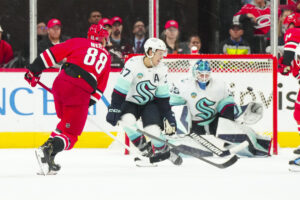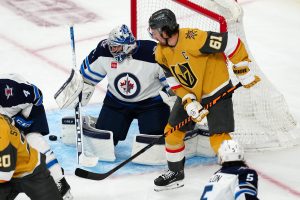With the NHL joining the other sports leagues on hiatus, we thought it would be a great time to take a look at how an international presence has changed the game here for the Vancouver Canucks. Well, “international” after we talk about the Canucks best ever Canadian to play for them, that is.
Quaint as it sounds now, the idea of the NHL “becoming diluted” by expanding was once considered a serious argument. And it might even have been true… if the league only ever included Canadians. Sure, international competition showed that Canada wasn’t alone in having skilled players, but that didn’t count. After all, only amateurs competed in the Olympics! Russia would get creamed if they ever played _real_ hockey players…
Take a bow, 1972. Don’t forget to boo the home team on your way out! The USSR winning the first game of that series 7-3 opened a lot of eyes. It was all the more shocking after Canada started up 2-0 six minutes into the game.
Competition from the upstart WHA forced teams to look elsewhere for talent and expansion into “open” cities. As it came known internationally that there was a living to be made, more athletes followed their dream of playing hockey in North America.
Only The Best
At first, only the best European players had a chance. Why would a team bring in a fourth-liner when there were plenty to choose from here? Early on fans were treated to players who had excellent skills, even if some complained that the newcomers didn’t play the game “our” way. A year of Borje Salming or Pelle Lindbergh – if not Ulf Sterner – soon cured that.
Now the NHL draws from nations all over Europe and as the game expands even more, it wouldn’t surprise anyone to see Asian nations start sending players. Yutaka Fukufuji was the first to play (and the second drafted), but he won’t be the last.
We’re starting the series with the most obvious nation, as you see. It will continue with American, Swede, Russian, Finn, and Czech/Slovak players as we get into Summer. Some choices will be tougher than others, but I hope they’ll all will be interesting for you. If we missed your favourite, let us know!
Canucks Best Ever: Canadian
Over the course of 50 years, the demographics of Canadian players is what you’d expect. Over 70% of Vancouver Canucks have been Canadian, and it all started with… Gary Doak. Not the team’s first captain, Orland Kurtenbach. Not the future coach/GM Pat Quinn. And not their first pick from the 1970 amateur draft Dale Tallon.
Doak was a hard-nosed defenceman who had just won the Stanley Cup with the Boston Bruins. The Canucks moved him on early in the 1972-73 season, and he eventually found his way back to the Bruins for the last eight years of his career.
Doak won’t be making the list. Here’s who does:
Roberto Luongo
Vancouver’s three runs to the Stanley Cup Finals were all on the backs of exceptional goaltenders, and 2011 was no different. When Roberto Luongo was traded to the Canucks in 2006, he had already established himself as a star with the Florida Panthers. In Vancouver, he was joining a team on the rise but was also dealing with controversy, with Todd Bertuzzi going the other way.
It was also a team that had missed the playoffs for the first time in five years and had been searching for stability in net since trading Kirk McLean in 1988. Luongo provided not just stability, but All-Star goaltending immediately. He played 76 games in that first season with a .921 SV% and 2.28 goals against. And that wasn’t even his best season.
In 2011, he finished the regular season with a .928 SV% and 2.11 goals against. In the playoffs he racked up a .914 SV% with a league-leading FOUR shutouts – two in the Final. Unfortunately, the Canucks’ vaunted offence couldn’t finish the job, and that was Luongo’s only Finals appearance.
He left the team after extensive public turmoil in a very messy separation, but even there he helped the team, bringing current starter Jacob Markstrom back in return.
Trevor Linden
The second overall pick in 1988 (behind Mike Modano), Trevor Linden finished second in Calder voting (behind Brian Leetch) that year. Linden started his career with a bang, getting 30 goals in his first season. He was named co-captain in 1990, taking the mantle alone the next year. In his first nine years with the team, Linden scored 548 points in 660 games, hitting 30 or more goals six times.
He had a dangerous shot, maintaining a 13.9 shooting percentage for his career. But his on-ice reputation was built on the playoffs, leading the Canucks to their second Stanley Cup Finals in 1994. Never a point-a-game player, he scored 25 in 24 games that year as the team fell to the New York Rangers. Linden’s career playoff scoring of 99 points in just 124 games gives him .8 points per game average, far outstripping his regular-season .627 ppg. When the game was on the line, his answer was to play even harder.
Linden took his role off the ice just as seriously, winning the King Clancy Memorial trophy in 1997 – the year before he was traded away. While the value for the trade was good, it was a move that shadowed GM Mike Keenan’s and Mark Messier‘s remaining time in Vancouver. Linden’s relationship with the city has anchored the team’s philosophy, and his eventual return was celebrated.
He became the first Canuck to play 1,000 games with the team, and the first to score 300 goals.
Tony Tanti
There were many, many names that could fill this place, but we’re going with arguably the Canucks’ first true sniper. When 19-year old Tony Tanti joined Vancouver in 1983, he would start in sheltered minutes behind established veteran Stan Smyl and 21-year old rookie Patrik Sundstrom. He had a reasonable first year, getting eight goals and sixteen points in 39 games. The next year, Sundstrom moved to the middle, and Tanti moved up. The result? A 91-point season for Sundstrom and 45 goals from Tanti.
Over the next four years, Tanti had seasons of 39, 39, 41, and 40 goals. His totalled 250 goals in just 531 games for Vancouver – a .471 goals-per-game only matched by Pavel Bure. He still sits sixth overall in goals scored, a position he’ll hold for at least a few years yet. Unfortunately, the team reached 75 points in his first year and got worse from there. While the Canucks reached the playoffs four of the seven seasons he was there at the end of the year, that was only because almost every team did.
Still, he was a reason for fans to buy tickets in a long slog of mediocrity. Is that enough to make him the Canucks best ever Canadian? Probably not, but he was a lot of fun to watch.
Want to Mention…
An argument for defenceman Dennis Kearns to be included could be made. Vancouver picked up the 5’9″ defenceman in the 1971 Intra-league draft. This is essentially an early version of waivers where teams could pick players from each other. Kearns stayed with the team for ten years and 677 games, reaching a career-high of 60 points in 1976-77. While that’s three back of Doug Lidster‘s defenceman record, Kearns finished his Canucks career with 14 more points in eleven more games. Really, it could be either one here, but I’ve docked points from Lidster for winning the Stanley Cup in… 1994.
Verdict
At last count, 444 Canadians have played for the Vancouver Canucks. That there are so few who are “stars” outside of the city is surprising. The choices for the Canucks best ever Canadian are relatively sparse. While the team has never had a first overall pick, they have drafted in the top five several times. The opportunity has been there, but the local boys have rarely broken through.
Agree? Disagree? Let us know!






